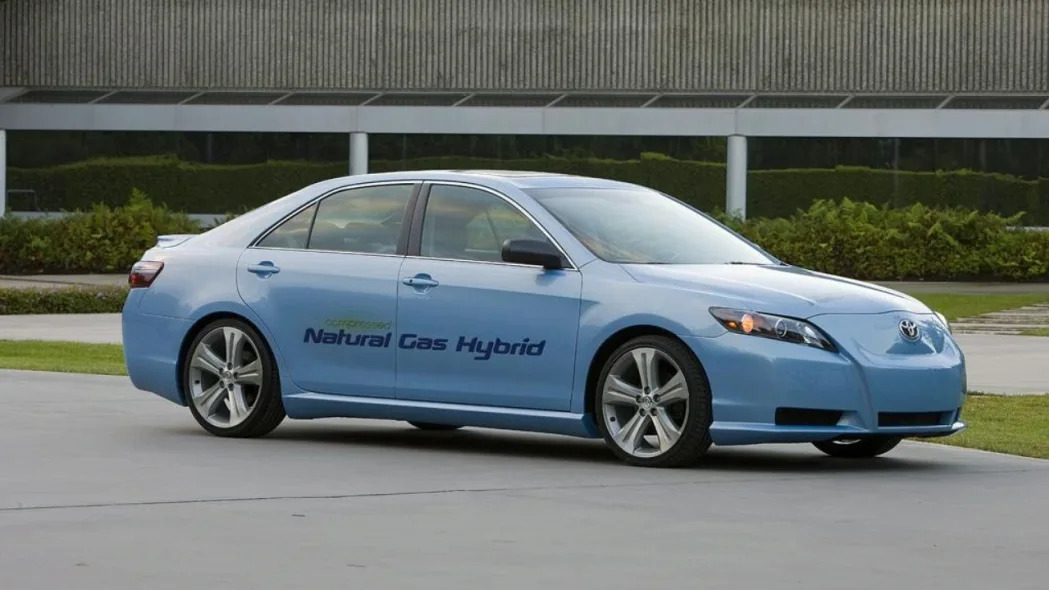Can you run a car on compressed natural gas? Yes, you can. Wow, that was easy. I guess we can wrap up this week's Greenlings post quickly. Not so fast. Like just about everything else in this world, the full answer is much more complicated than the simple yes. Here in the United States, there are but a handful of vehicles available that are equipped from the factory to run on CNG, and there are even fewer places to get those vehicle's gas tanks topped off with the stuff. Have a car that you want to convert? That's great, but a number of major modifications are required to run a vehicle on natural gas if it was originally intended to burn gasoline.
 For these reasons and a few more, just one tenth of one percent of all natural gas consumed in the United States is currently used for transportation. Most of it is used to generate electricity and to heat people's homes and food. That's a shame, as liquefied and compressed natural gas hold significant promise as a viable alternative to other fossil fuels in the transportation sector. How so? Click past the break to keep reading this week's Greenlings.
For these reasons and a few more, just one tenth of one percent of all natural gas consumed in the United States is currently used for transportation. Most of it is used to generate electricity and to heat people's homes and food. That's a shame, as liquefied and compressed natural gas hold significant promise as a viable alternative to other fossil fuels in the transportation sector. How so? Click past the break to keep reading this week's Greenlings.
Why use compressed natural gas in the first place, and why use it for cars?
For one, CNG is cheaper than gasoline or diesel. Lots cheaper, in fact – in some cases about a third of the price of an equivalent amount of gasoline. In addition, natural gas burns significantly cleaner than other fossil fuels.
The United States EPA lists the following statistics about vehicles running on natural gas:
 For these reasons and a few more, just one tenth of one percent of all natural gas consumed in the United States is currently used for transportation. Most of it is used to generate electricity and to heat people's homes and food. That's a shame, as liquefied and compressed natural gas hold significant promise as a viable alternative to other fossil fuels in the transportation sector. How so? Click past the break to keep reading this week's Greenlings.
For these reasons and a few more, just one tenth of one percent of all natural gas consumed in the United States is currently used for transportation. Most of it is used to generate electricity and to heat people's homes and food. That's a shame, as liquefied and compressed natural gas hold significant promise as a viable alternative to other fossil fuels in the transportation sector. How so? Click past the break to keep reading this week's Greenlings.
Why use compressed natural gas in the first place, and why use it for cars?
For one, CNG is cheaper than gasoline or diesel. Lots cheaper, in fact – in some cases about a third of the price of an equivalent amount of gasoline. In addition, natural gas burns significantly cleaner than other fossil fuels.
The United States EPA lists the following statistics about vehicles running on natural gas:
- Reduce carbon monoxide emissions 90%-97%
- Reduce carbon dioxide emissions 25%
- Reduce nitrogen oxide emissions 35%-60%
- Potentially reduce non-methane hydrocarbon emissions 50%-75%
- Emit fewer toxic and carcinogenic pollutants
- Emit little or no particulate matter
- Eliminate evaporative emissions
What vehicles are currently available that use natural gas?
Here in the U.S., the list is tiny. There's the Honda Civic GX and the... um, well that's it from the major manufacturers, at least on the consumer level, and the GX is only available in California and New York. At least it's a solid choice. The United States EPA rates the Civic GX as the cleanest car available in America.
Further, the automotive CNG industry was dealt a serious blow earlier this month when Fuelmaker, a producer of natural gas refueling systems, was forced into involuntary bankruptcy by parent company Honda.
Many automakers currently produce vehicles equipped to run on CNG for fleet or government use. All told, there are currently 120,000 natural gas vehicles on the road in America, which is a tiny number in comparison to the millions of gas and diesel vehicles. According to Wikipedia, there were over 7 million natural gas vehicles on the roads worldwide in 2008, mostly in Europe, Asia and South America.
Are there any drawbacks to using natural gas in a vehicle?
Of course there are. Besides the fact that there's only one actual production CNG vehicle in America, there are other reasons why consumers don't often consider CNG a viable option. One big drawback is that it's more difficult to refill the fuel tank of a car that runs on natural gas. Another problem is that the storage tanks required for natural gas are big and bulky, so there's a give-and-take relationship between how much fuel is carried and how far you can travel.
Finally, there aren't all that many places to refuel a natural gas vehicle. The U.S. Department of Energy operates a website with natural gas filling stations that you can find here. Check the box for compressed natural gas, enter your zip code and have at it.
What does the future hold for natural gas vehicles?
One of the most well-known proponents of natural gas for transportation is T. Boone Pickens, a man who made most of his fortune on oil. Now, Pickens is pushing forward with a plan to divert the natural gas that's currently used to generate electricity to our transportation sector. Of course, that would offer little help without a corresponding increase in the number of vehicles that run on natural gas. There have been concept CNG vehicles like the CNG Camry Hybrid and Mercedes-Benz B-Class, but so far no more automakers have announced plans to offer natural gas vehicles in the U.S.
If you don't want to wait for more major manufacturers to begin producing natural gas vehicles, there are a number of companies out there that will convert your car to run on natural gas. The U.S. Department of Energy keeps a list of companies that offer conversions, click here to check it out.



Sign in to post
Please sign in to leave a comment.
Continue